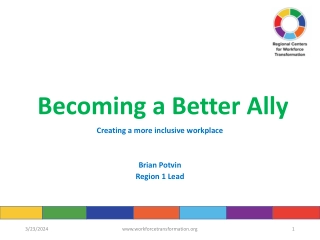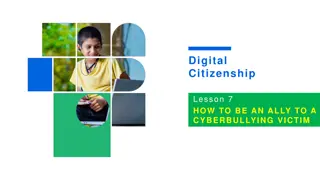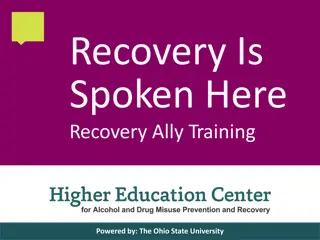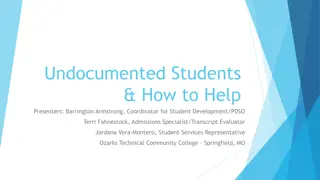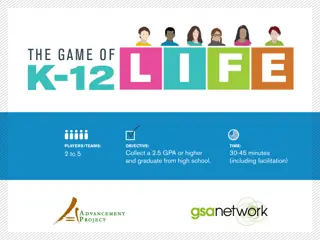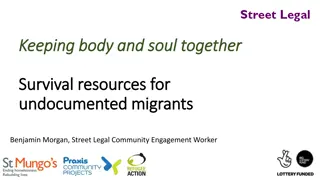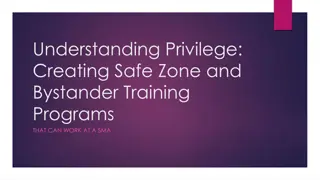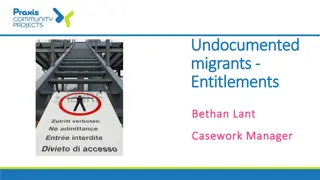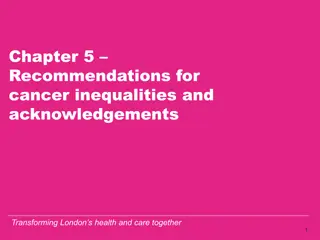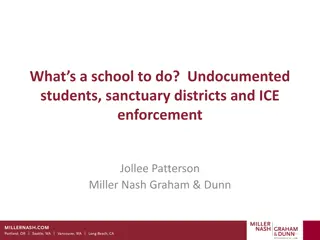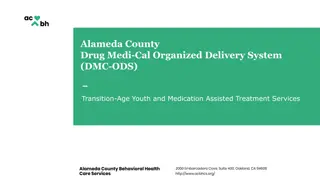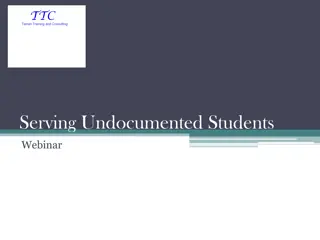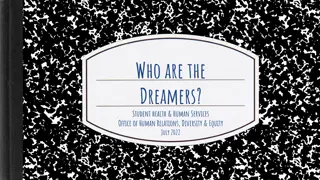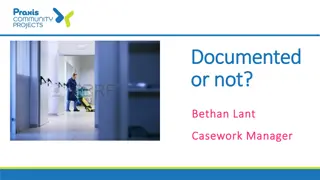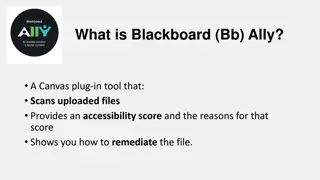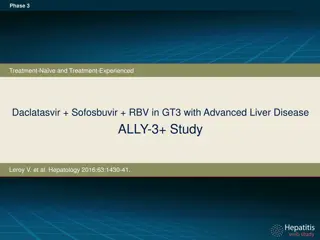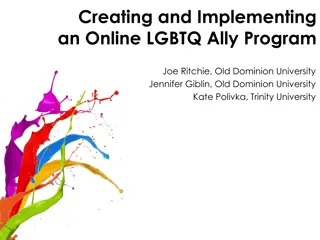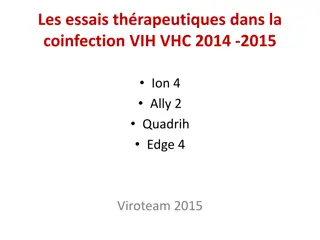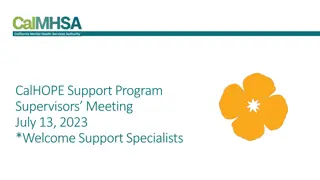Understanding Undocumented Student Ally Training
Join the Department of Student Diversity & Multicultural Affairs for the Share the DREAM Undocumented Student Ally Training on December 7, 2016. The training covers topics like Jesuit values, legislative information, terminology, and best practices for supporting undocumented students. It aims to create awareness, promote inclusivity, and offer insights into the experiences of undocumented students.
Download Presentation

Please find below an Image/Link to download the presentation.
The content on the website is provided AS IS for your information and personal use only. It may not be sold, licensed, or shared on other websites without obtaining consent from the author. Download presentation by click this link. If you encounter any issues during the download, it is possible that the publisher has removed the file from their server.
E N D
Presentation Transcript
Share the DREAM Undocumented Student Ally Training Brought to you by the Department of Student Diversity & Multicultural Affairs December 7, 2016
Agenda Conditions for Success Jesuit Mission & Values Goals for Training Terminology and Statistics The Undocumented Student Legislation Best Practices of Supportive Educators Q&A
Conditions for Success Maintain confidentiality Actively listen to one another Respect Use "I" Statements Share the lesson not the story Be cognizant of your learning edges Support each other Honesty Phones turned off/on silent (Be Present)
Jesuit Mission & Values In 2010, [at the Jesuit President s meeting] the Jesuit Presidents stated that " the primary mission of Jesuit higher education is the education and formation of our students for the sake of the kind of persons they will become and their wide influence for good in society, in their lives, professions, and service. Our Ignatian heritage is the living legacy of Saint Ignatius Loyola. It is a rich heritage of faith, seeking God in everyday life; a profound commitment to the poor and to issues of social responsibility and justice. Ignatius believed that it is imperative to act upon what is learned to use our values in service to humanity because we are called to make a difference as persons for others.
Goals for Training Exploring the experiences & perspectives of undocumented students. Generating knowledge for self-learning and growth. Increasing campus support and inclusion for undocumented students.
Terminology Cultural Citizenship Legal Citizenship: Individuals who are residing in the U.S. legally due to the attainment of permanent residency or citizenship through a visa or green card (these individuals obtain a SSN).
Terminology Undocumented Student An undocumented student, as defined by the National Immigration Law Center, is a foreign national who: (1) entered the United States without inspection or with fraudulent documents; or (2) entered legally as a non-immigrant but then violated the terms of his or her status and remained in the United States without authorization. Unauthorized- This term is used to highlight the fact that individuals have documents (i.e. birth certificate, a form of identification card, and so forth), but that they are residing in the U.S. without legal authorization, thus unauthorized. Non-Citizen The non-citizen category applies to outside of the U.S. and who have not applied for or have been granted citizenship. Permanent residents also fall into this category. students born
Terminology Entry without Inspection: Refers to individuals who have entered the U.S. without presenting normative government accreditation (i.e. visa). Mixed Status Family- Mixed Status Family refers to students that are either: undocumented, but have family members that are U.S. residents or U.S. citizens; are U.S. residents or U.S. citizens but have family members that are undocumented.
Terminology DREAM Act - The Development Relief and Education for Alien Minors (DREAM) Act is a piece of legislation proposed to provide a pathway to permanent residency and U.S. citizenship for qualified undocumented immigrant youth. The DREAM Act has been proposed several times in Congress but has not been approved. DREAMers DREAMers refers to students who are undocumented and would hypothetically qualify for the DREAM Act had it passed. DREAMer is a term commonly used by students who connect with the DREAM Act movement, and sometimes used as a way to navigate away from the negative connotations given to terms such as undocumented, immigrant, non-U.S. citizen, and so forth. All DREAMers are undocumented immigrants, but not all undocumented immigrants are DREAMERs. DACA - Deferred Action for Childhood Arrivals (DACA) program was passed by President Obama as a executive action that allows certain undocumented immigrants to be exempt from deportation for a period of two years as well as being able to apply for work authorization during this time.
Terminology Dropping the I-Word: "Illegal" is a racially charged slur used to dehumanize and discriminate against immigrants and people of color regardless of migratory status. The I-word is shorthand for "illegal alien," "illegal immigrant," and other harmful terms. 11
The Undocumented Student
Undocumented Students in the U.S. 500,000 Students 9-12 65,000 Graduate High School 7,000 - 13,000 enroll in College Few Graduate Who are these students? They are NOT all Latino 1 in 7 Koreans in the U.S are estimated to be undocumented Asian undocumented students may find it difficult to groups that are heavily Latino They were brought to the U.S. at a very young age Many may not have realized they re here in violation of immigration laws participate in Source: Pew Hispanic Center, Department of Homeland Security, UWD
Undocumented Students Although they share parallel experiences, each has a unique story Intersections of identities and various needs Range of time in country Mixed status family Hyperdocumentation
Julio Salgado: Two oppressed minorities For a long time I was in hiding about my sexuality and immigration status. But I m proud to be out. 16
Barriers Faced by DREAMers Ineligible to apply for FAFSA (governmental financial aid) and many scholarships Ineligible for specific degrees such as teaching (varies by state) Ability to travel internationally only through advance parole* Not eligible for paid internships Psychological/ Emotional impact and stressors
Loyola University Chicago Undocumented Student Initiatives Timeline *2014 Loyola University Chicago Student Collaborative (USUS) finishes meeting in April 2014 recommenda tions on to President and Cabinet. - LoyolaStritch School of Medicine admits first cohort of DACA eligible students.
Loyola and Undocumented Students Undergraduate or graduate students do not have to disclose their status on their application to Loyola Share the Dream Undocumented Student Ally Training Undocumented & Proud (UP) Arrupe College: Dreamers & Allies student organization Magis Scholarship Fund Created by Student Government and Latin American Student Organization Fundraising efforts & collaboration with Advancement 5 first-year recipients (Fall 2015) 2 first-year & 2 transfer student recipients (Fall 2016)
Legislation HB60 - House Bill 60: passed in 2003, allows young undocumented students in Illinois to pay in-state tuition when attending public universities in Illinois. SB 2185 - IL DREAM Act: The first senate bill in the country to create a private scholarship fund for undocumented youth. This bill also mandates training for high school counselors to be knowledgeable on the college options for DREAMers. SB2196 - Student Access Bill: Passage of the Student ACCESS Bill would allow 4-year public universities to offer financial aid to every student enrolled at their institution on a competitive basis. The legislation will not, however, make undocumented students eligible to apply for the MAP Grant. DREAM Act- The Development Relief and Education for Alien Minors (DREAM) Act is a piece of legislation proposed to provide a pathway to permanent residency and U.S. citizenship for qualified undocumented immigrant youth. The DREAM Act has been proposed several times in Congress but has not been approved.
Undocumented Students and Higher Education
What is Deferred Action for Childhood Arrivals (DACA)? A form of protection from deportation that lasts for 2 years and can be renewed. Those who can show economic necessity can obtain a work permit, a SS#, and a driver's license in most states. Important to remember: it is a memorandum NOT a law. Cost of application is $465 (includes work permit and biometrics). increase to $495 after Dec 23 DACA Expansion/DAPA - Currently blocked
DACA Eligibility Came to the U.S. while under the age of 16. Continuously resided in the U.S. from January 1, 2010 to the present. Entered the U.S. without inspection before June 15, 2012, or individuals whose lawful immigration status expired as of June 15, 2012. Physically present in the United States on June 15, 2012, and at the time of making the request for consideration of deferred action with USCIS (U.S. Citizenship and Immigration Services).
DACA Eligibility Are currently in school, have graduated from high school, have obtained a GED, or have been honorably discharged from the Coast Guard or U.S. Armed forces. Have not been convicted of a felony offense, a significant misdemeanor, or more than three misdemeanors and do not pose a threat to national security or public safety. Did not have lawful status on June 15, 2012. Are at least 15 years old (may be younger if in removal proceedings).
Current DACA Numbers As of June 2016: Total requests received (since 2012): 1,541,960 Requests accepted: 1,451,195 Requests rejected: 90,765 Requests approved: 1,267,834 Requests denied: 64,972 *Please note: The report reflects the most up-to-date estimate available at the time the report is generated. Source: USCIS
Pros and Cons of DACA Pros Cons Work Permit Driver s License Request to travel Valid state I.D. No long term benefits Can lead to deportation Benefits vary by state Can be taken away at any time No right to appeal 28
DACA Renewal Process Must meet initial guidelines. Must renew within 150-120 days prior to expiration. Same cost: $465 No need for additional documents unless: New documents involving removal proceedings or criminal history that have not been previously submitted. Any change of address must be noted. Work authorizations already issued for a two-year period under the current guidelines will continue to be valid through the validity period indicated on the card. USCIS is exploring means to extend previously issued two-year work authorization renewals to the new three-year period.* www.unitedwedream.org/dacarenewal/
The Secrets of Strangers The Secrets of Strangers, Directed by Rocsi Diaz "The Secrets of Strangers" brings together complete strangers who share an intimate secret about their identity. #ImmigrantHeritageMonth Rocsi Diaz, Director James Adolphus, Cinematographer Michael Skolnik, Executive Producer Joseph La Morte Gloria La Morte, Producers Flannery Miller, Co-Producer Paola Mendoza, Writer Monica Cohen Renato Milone, Original Music A special thank you to: HOLA (Heart of LA) Dream Resource Center IDEAS at UCLA United We Dream 30
Processing Questions What were your initial reactions to watching the video? What did you observe by the person receiving the news? What did you observe by the person sharing their status? 31
Case Studies What is the situation? How would you approach it? Write out your steps. What questions would you raise? Where, if at all, do you feel hesitant? 32
Best Practices Encourage cultural competency through workshops Know your undocumented population LUC, Chicago, IL Be aware of current and new policies that affect undocumented students. Be an active ally Creating safe space Listen without interruptions, ask open-ended questions, and sit in silence if that is what the person needs. Cognizant of terminology Drop the I word Confidentiality Remember that individuals are sharing their status because they TRUST you. It is up to the person to share their status. Always ask permission if you are referring a person to a service/resource. Ask the tough questions, don t assume we can t do that.
Best Practices Know who to refer students to when you don't know the answer. Encourage students to apply for scholarships/unpaid internships. Share "Know your Rights Knowledge (Miranda Rights) & students confidentiality under FERPA. Keep in mind legal, financial, and educational hurdles. If you sit on boards, committees, etc. bring up issues faced by DREAMers (Scholarships that do not ask for SSN). 34 Celebrate students resiliency.
Resources Latinos Progresando 3047 W. Cermak Rd., Chicago, IL 60623 (773) 542-7077 latinospro.org/ The Resurrection Project (Pilsen) 1818 S. Paulina Street, Chicago, IL, 60608 resurrectionproject.org/ United We Dream unitedwedream.org/ National Immigrant Justice Center 208 S. LaSalle St., Suite 1300, Chicago, IL 60604 (312) 660-1370 www.immigrantjustice.org/immigrant-legal-defense-services Illinois Coalition for Immigrant and Refugee Rights icirr.org/ Organized Communities Against Deportations (Former IYJL) https://www.facebook.com/OCADIL/
Final Points Website http://www.luc.edu/diversity/resources/undocumentedstudentresources/ Questions/Comments Evaluations Magis Scholarship Fund reminder Something to think about: Think of one undocumented student with whom you work. What is one concrete thing you can do as his or her ally to show your support?
Additional Questions? Department of Student Diversity & Multicultural Affairs (SDMA) Diversity@luc.edu (773) 508-3909 Joe Saucedo Director, SDMA jsaucedo4@luc.edu (773) 508-3948


